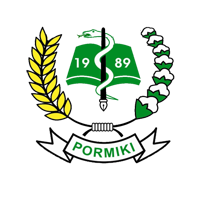Evaluasi Manfaat Penerapan Telemedicine di Negara Kepulauan: Systematic Literature Review
Abstract
Abstract
Telemedicine is the use of medical information exchanged from one site to another through electronic communication to improve the clinical health status of patients. Telemedicine can be one of the solution options to overcome the limitations of health workers. This study aims to describe the benefits of implementing Telemedicine in archipelagic countries. This type of research is a Systematic Literature Review with literature sourced from Elsevier, Garuda, IEEE Xplore, NCBI, PubMed, ProQuest, ResearchGate, Science Direct, and Springer. Literature selection using PRISMA, obtained 257 scientific articles consisting of duplicate data 15, did not enter the topic 73, did not meet the inclusion & exclusion criteria 154, did not meet the minimum standard of SRQR 4 and only 10 were used. The results of the analysis obtained are 5 of the 19 archipelagic countries that are related, namely Cape Verde, the Philippines, Indonesia, Papua New Guinea, and Sao Tome & Principe. Furthermore, improving access to care in the form of eliminating trips that are burdensome for patients, making it easier for patients to access health services through patient devices. The nearest Telemedicine satellite device. Then the timeliness in treatment is to facilitate the diagnosis of patients and patient health care. Then the increase in patient satisfaction and involvement of patient satisfaction and patient involvement. Meanwhile, the increase in demand and cost-effectiveness is obtained in the form of efficient services, increasing patient expectations. The benefits of implementing Telemedicine are mostly in Cape Verde and the least in Papua New Guinea.
Keywords: telemedicine, telemedicine application, archipelago country
Abstrak
Telemedicine sebagai penggunaan informasi medis yang dipertukarkan dari satu situs ke situs lain melalui komunikasi elektronik untuk meningkatkan status kesehatan klinis pasien. Telemedicine bisa menjadi salah satu opsi solusi mengatasi keterbatasan tenaga kesehatan. Penelitian ini bertujuan mendeskripsikan manfaat penerapan Telemedicine di negara kepulauan. Jenis penelitian Sytematic Literature Review dengan literatur bersumber dari Elsevier, Garuda, IEEE Xplore, NCBI, PubMed, ProQuest, ResearchGate, Science Direct, dan Springer. Seleksi literatur menggunakan PRISMA, diperoleh 257 artikel ilmiah terdiri dari duplikasi data 15, tidak masuk topik 73, tidak masuk kriteria inklusi & eksklusi 154, tidak masuk standar minimal SRQR 4 dan hanya 10 yang digunakan. Hasil analisis yang diperoleh ada 5 dari 19 negara kepulauan yang terkait yakni Cape Verde, Filipina, Indonesia, Papua New Guinea, dan Sao Tome & Principe.Selanjutnya pada peningkatan akses perawatan berupa menghilangkan perjalanan yang memberatkan pasien, memudahkan pasien mengakses layanan kesehatan melalui perangkat pasien/perangkat satelit Telemedicine terdekat. Lalu ketepatan waktu dalam perawatan yakni memudahkan penegakan diagnosis pasien dan perawatan kesehatan pasien. Kemudian peningkatan kepuasan dan keterlibatan pasien adanya kepuasan pasien dan keterlibatan pasien. Sedangkan pada peningkatan permintaan dan hemat biaya diperoleh berupa layanan yang efisien, meningkatnya ekspektasi pasien. Adapun manfaat penerapan Telemedicine paling banyak di negara Cape Verde dan paling sedikit di Papua New Guinea.
Kata Kunci: telemedicine, penerapan telemedicine, negara kepulauan
Full Text:
PDFReferences
Prawiroharjo P, Peter P, Librianty N. Layanan Telemedis di
Indonesia : Keniscayaan, Risiko, dan Batasan Etika. J Etika
Kedokt Indones. 2019;3(1):1–9.
Correia A, Azevedo V, Lapão LV. Implementation of Telemedicine
in Cape Verde : Influencing Factors. 2017;30(4):255–62.
Parsikia A, Latifi F. Telemedicine Consultation as an Indicator of
Local Telemedicine Champions’ Contributions, Health Care
System Needs or Both: Tales from Two Continents.
;00(00):1–7.
Arcellana-nuqui E, Fontelo PA, Marcelo AB. Telepathology in the
Philippines : A Review and Future Prospects. 2016;50(4):201–5.
Sarfati D, Dyer R, Vivili P, Herman J, Spence D, Sullivan R, et al.
Cancer control in small island nations : from local challenges to
global action. Lancet Oncol [Internet]. Elsevier Ltd;
;380(9856):1–14. Available from:
http://dx.doi.org/10.1016/S1470-2045(19)30511-X
Syed-abdul S, Scholl J. Telemedicine Utilization to Support the
Management of the Burns Treatment Involving Patient Pathways in
Both Developed and Developing Countries : A Case Study.
;207–12.
Anderson R, Beckett B, Fahy K, Gordon E, Gray A, Kropp S, et al. T
Telemedicine Toolkit. Chicago: AHIMA; 2017. 1-34 p.
Undang-Undang Republik Indonesia Nomor 32 Tahun 2014 Tentang
Kelautan. 2014.
Huang GKL, Pawape G, Taune M, Hiasihri S. Telemedicine in
Resource-Limited Settings to Optimize Care for Multidrug-Resistant
Tuberculosis. 2019;7(August):1–5.
Indria D, Alajlani M, Fraser HSF. Clinicians perceptions of a
Telemedicine system : a mixed method study of Makassar City,
Indonesia. BMC Medical Informatics and Decision Making;
;7:1–8.
Keputusan Menteri Kesehatan Republik Indonesia Nomor
HK.02.02/Menkes/409/2016 tentang Rumah Sakit Uji Coba
Program Pelayanan Telemedicine Berbasis Video-Conference dan
Teleradiologi. Jakarta; 2016.
WHO. Telemedicine Opportunities and Developments in Member
States. Vol. 2. 2010.
ATA. Telehealth : Defining 21 st Century Care. 2020.
Krumm M, Syms MJ. Teleaudiology. In: Telemedicine. 2011. p.
–304.
Hannah KJ, Ball MJ. Telenursing. Kumar S, Snooks H, editors.
British Library; 2011.
Alexander E, Butler CD, Darr A, Jenkins MT, Long R., Shipman C.,
et al. Statement on Telepharmacy. Vol. 74. 2017.
Brennan D, Tindall L, Theodoros D, Brown J, Campbell M,
Christiana D, et al. A Blueprint for Telerehabilitation Guidelines.
;2(2):31–4.
Peraturan Menteri Kesehatan Republik Indonesia Nomor 20 Tahun
tentang Penyelenggaraan Pelayanan Telemedicine Antar
Fasilitas Pelayanan Kesehatan. 2019.
ATA. Telemedicine Basics. 2020.
Agoes ER. Praktik Negara-Negara Atas Konsepsi Negara
Kepulauan. 2004;I(April):441–64.
Latifi R, Dasho E, Merrell RC, Lopes M, Azevedo V, Bekteshi F, et
al. Cabo Verde Telemedicine Program: Initial Results of
Nationwide Implementation. 2014;20(11):1027–34.
Lisboa UN De, Verde C. Telemedicine Service Improves Access to
Pediatric Cardiology in Cape Verde. 2013;1–8.
Nugraheni R, Sanjaya GY, Setyawati S, Putri M, Lazuardi L,
Arista A, et al. Low Utilization of Telemedicine in the First Year
Trial : A Case in the Province of West Papua , Indonesia.
;22(Ishr 2019):568–71.
Parikh NR, Chang EM, Kishan AU, Kaprealian TB, Steinberg ML,
Raldow AC. Time-Driven Activity-Based Costing Analysis of
Telemedicine Services in Radiation Oncology. Radiat Oncol Biol
[Internet]. Elsevier Inc.; 2020;108(2):430–4. Available from:
https://doi.org/10.1016/j.ijrobp.2020.06.053
DOI: https://doi.org/10.47007/inohim.v9i2.261
Refbacks
- There are currently no refbacks.
Lembaga Penerbitan Universitas Esa Unggul
Jl Arjuna Utara No 9. Tol Tomang, Kebon Jeruk, Jakarta. 11510
Email : [email protected]

This work is licensed under a Creative Commons Attribution-NonCommercial 4.0 International License.
View My Stats




